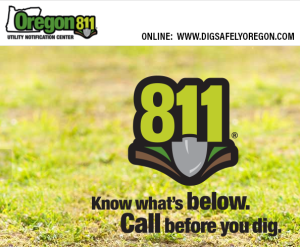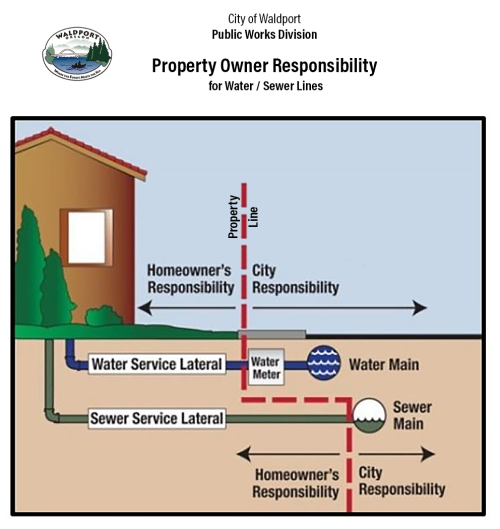Helpful FAQs - Public Works
 Municipal Water/Sewer, Drainage and the Public Right of Way (Streets / Sidewalks)
Municipal Water/Sewer, Drainage and the Public Right of Way (Streets / Sidewalks)Q. Do I need a permit for everything I do to my home?
According to the Oregon Residential Specialty Code (ORSC), Section R105.1; a permit shall be obtained through application to the Lincoln County building official when constructing, enlarging, altering, repairing, moving or changing the occupancy, or installing any electrical, gas, mechanical or plumbing system regulated by code. This requirement applies to an owner, contractor or authorized agent who constructs, enlarges alters, repairs moves, or changes the occupancy of a building or structure; or for the purpose of erecting, installing, enlarging, altering, repairing, converting or replacing any electrical, gas mechanical or plumbing systems.
Not all items require permits. The following is a list of items that do not require a permit: (Even though a permit is not required, the project must still comply with all applicable construction and zoning codes. Permits are not required for the following when related to single family homes and do not encroach over a subsurface drain system, public utility easement, or into required setbacks from property lines)
- Water tanks supported directly upon grade if the capacity does not exceed 5,000 gallons and the ratio of height to diameter or width does not exceed 2 to 1.
- Concrete sidewalks, slabs, and driveways.
- Gutters and downspouts.
Plumbing Exceptions:
- The stopping of leaks in drains, water, soil, waste or vent pipe; provided, however, that if any concealed trap, drainpipe, water, soil, waste or vent pipe becomes defective and it becomes necessary to remove and replace the same with new material, such will shall be considered a new work and a permit shall be obtained and inspection made as provided in this code.
- The clearing of stoppages or the repairing of leaks in pipes, valves or fixtures, and removal and the reinstallation of water closets, provided such repairs do not involve or require the replacement or rearrangement of valves, pipes or fixtures.
- Emergency repairs
- Where mechanical equipment replacements and repairs must be performed in an emergency situation, the permit application shall be submitted within the next working business day to the building official.
Q. Why should I use a licensed contractor?
- Any contracted person doing work who is not currently registered with the Oregon State Construction Contractors Board (CCB) is doing so illegally.
- You would not want this type of person working on your home.
- The registration process provides some protection to the homeowner from being charged for work and materials not provided or paying twice for them (material suppliers and subcontractors can place a lien on your home if they do not receive payment from your contractor).
- There are also trade licenses for those persons doing plumbing and electrical work to provide some assurance that they have adequate knowledge and training in those fields.Always check with CCB to see if a contractor is licensed.
Q. Why do I need inspections and do I have to pay for these inspections?
Inspections are required at various stages of the project to see that the work is following the approved plans and codes. There is no additional charge for the inspection’s, they have been paid for with the permit fees.
Q. Are there any special requirements when installing a sprinkler system in my yard?
Yes, all new irrigation systems need to be installed with backflow protection in the form of a testable, State of Oregon approved double check valve assembly and a plumbing permit is required for this installation. The device is required to be tested every year by a licensed tester and the results forwarded to the local water department. In addition to a plumbing permit, if more than 500 square feet of soil is disturbed, an Erosion Control permit and plans may be required.
Q. What are some projects that may trigger Public Works Requirements?
A new Single Family Residence (SFR) or some additions may require ½ or full street improvements for curbs, gutters and sidewalks. The impact of these requirements vary widely from jurisdiction to jurisdiction. Always do your due diligence before investing money into a project
Q. Will I need a permit to replace or widen a driveway approach?
Yes a Right-of-Way (ROW) permit will be required. Driveway standards vary so always check with Public Works for specific standards.
Q. My sewer line may be failing, what portion is my responsibility and what portion is the city's?
This graphic is a clear explanation of who has responsibility for: water and waste lines

| Attachment | Size |
|---|---|
| 110.86 KB | |
| 45.06 KB | |
| 53.82 KB | |
| 1.53 MB | |
| 773.01 KB |

